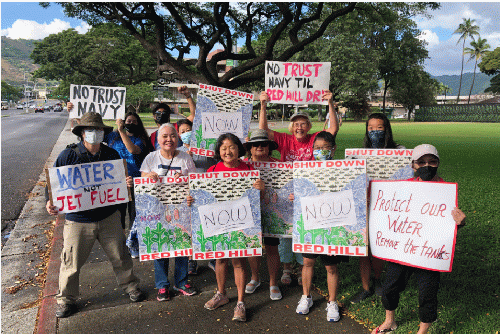$1.1 BILLION and Counting for U.S. Navy's Obstinance in Shutting Down Dangerous, Leaking Red Hill Jet Fuel Tanks in Honolulu
Navy Decisions on Red Hill Jet Fuel Tanks Very Costly to Military Families, Taxpayers and Hawaii's Environment
By Colonel (Ret) Ann Wright
Total Congressional funding for all aspects of the Navy's Red Hill water contamination debacle is now over $1.1 billion according to Hawai'i Congressional representative Ed Case and billions more are needed to complete clean-up, defueling and closing of the massive leaking Red Hill jet fuel storage facility.
In a news release on March 9, 2022, Rep. Case said, "These funds ($700 million) are in addition to the $403 million in emergency funding we obtained in another bill we passed just weeks ago, bringing Congress' total funding for all aspects of Red Hill in the current fiscal year alone to over $1.1 billion. But billions more will be required to complete all aspects of the cleanup, stabilization, defueling and closing of Red Hill and the relocation of its fuel and build fuel storage capacity elsewhere."
The Red Hill funding appropriation includes $50 million to the Navy for planning and design of future water treatment and distribution infrastructure projects to address the Red Hill drinking water contamination.
A paltry $5 million was included for the improvement of the safety of underground fuel storage tanks at Red Hill as the Navy works to defuel the facility.
The majority of the Red Hill funding includes "$686 million for continued support to displaced service members, civilians and their families." Thousands of military families were housed in Waikiki hotels for up to three months and were provided temporary living allowances for food and other services.
The appropriation requires the Pentagon give Congress a report within 90 days that would identify future military construction and remediation requirements for Red Hill's permanent shutdown.
While the Red Hill water crisis strained relations between military leaders and lawmakers, Hawaii's congressional delegation has lobbied their Congressional counterparts to increase military budgets and operations in Hawaii and the Pacific, not only for Red Hill issues, but other military items, including the "will-it-ever-die" Homeland Defense Radar and Pearl Harbor shipyard.
After two months of military teams "flushing" main pipes and household water taps in the affected areas and testing of only 5% of the 9,715
homes, on
March 17, 2022, the Hawai'i State Department of Health cleared the drinking water for the last of 19 zones that contained military and civilian family housing and Navy operational buildings that were contaminated by jet fuel.
With the amendment of the health advisory, the military housing offices for the residential areas notified by email residents from the Joint Base Pearl Harbor-Hickam (JBPHH) commanding officer stating their water is safe to drink.
The families who are still occupying temporary alternate lodging are expected to return to their residences within two days.
Most families are not using the water coming from the housing taps. With clean water distribution sites that have provided clean water to families for over 3 months being discontinued on March 21, many families have told local media that they will be purchasing water for drinking and showering as they do not trust the water coming from their "flushed" taps.
Military families who have returned to their homes are reporting air contamination in their homes with many persons having headaches and needing to leave their homes for fresh air. Tap water poured into pans is still showing sheens of fuel. Pets are still refusing to go into yards that have been sprayed with water from sprinkler systems.
Additionally, three months into the health crisis, the military has still not sent a toxicology team to the military medical facilities to help address the long term health concerns of the families.
Next Page 1 | 2
(Note: You can view every article as one long page if you sign up as an Advocate Member, or higher).






